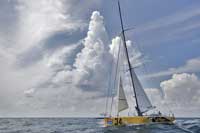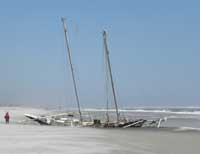Last August, we posted about the collision of the containership MSC Chitra and the bulk carrier Khalijia 3 which resulting in the sinking of the Chitra with a significant oil spill, a loss of cargo containers and the blockage of the port of Mumbai for five days. Maasmond Maritime’s Clipping Service recently publish dramatic photos of the scuttling of the MSC Chitra, after a six day tow to deep water by Titan Maritime approximately 385 miles off of the coast of Mumbai, India. Click the thumbnails for larger images.


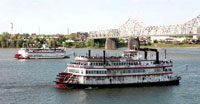 The Ohio River may just be too high to allow the running of the
The Ohio River may just be too high to allow the running of the 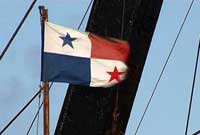 In yesterday’s New York Times, Rose George of Leeds, UK was an Op-Ed Contributor. In her essay,
In yesterday’s New York Times, Rose George of Leeds, UK was an Op-Ed Contributor. In her essay,  A sign of changing times. A Russian submarine will be participating in a NATO undersea rescue exercise off the Spanish coast scheduled for next month.
A sign of changing times. A Russian submarine will be participating in a NATO undersea rescue exercise off the Spanish coast scheduled for next month.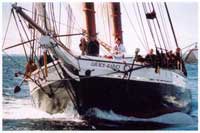 For hundreds of years, coastal schooners carried cargoes up and down the hundred harbored coast of Maine. By the early part of the last century, the schooners were being replaced by trucks and trains. In 1936 Captain Frank Swift started buying laid up schooners to cruise in the Maine summers. Schooners that had carried stone, lumber, hay and all manner of goods, began carrying vacationers. Now 75 years later the Maine windjammer fleet is still going strong, preserving the schooners and their heritage while delighting tens of thousands who have sailed on them.
For hundreds of years, coastal schooners carried cargoes up and down the hundred harbored coast of Maine. By the early part of the last century, the schooners were being replaced by trucks and trains. In 1936 Captain Frank Swift started buying laid up schooners to cruise in the Maine summers. Schooners that had carried stone, lumber, hay and all manner of goods, began carrying vacationers. Now 75 years later the Maine windjammer fleet is still going strong, preserving the schooners and their heritage while delighting tens of thousands who have sailed on them.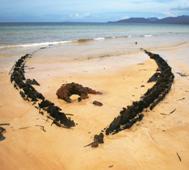 As the sands of Fire Island are swallowing
As the sands of Fire Island are swallowing 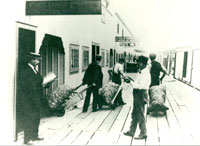
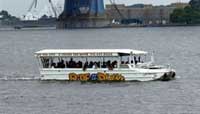 The Ducks have returned to the Delaware River. Not mallards, but duck boats.
The Ducks have returned to the Delaware River. Not mallards, but duck boats. 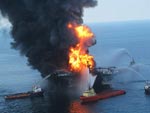 The Coast Guard released a report yesterday that was highly critical of Transocean, the owner of the Deepwater Horizon drill rig, which exploded and sank last year.
The Coast Guard released a report yesterday that was highly critical of Transocean, the owner of the Deepwater Horizon drill rig, which exploded and sank last year.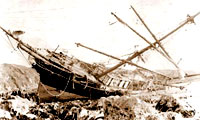 It is not champagne, but whiskey bottles which are still appearing from the sands where the sailing ship Stuart wrecked 110 years ago on Easter Sunday off the Llyn peninsula of Northern Wales.
It is not champagne, but whiskey bottles which are still appearing from the sands where the sailing ship Stuart wrecked 110 years ago on Easter Sunday off the Llyn peninsula of Northern Wales. In July of last year
In July of last year 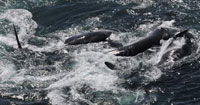

 Douglas Faulkner, who died recently, had a varied and highly accomplished career as a naval and marine architect. He was involved in the design and testing of the first British nuclear submarine,
Douglas Faulkner, who died recently, had a varied and highly accomplished career as a naval and marine architect. He was involved in the design and testing of the first British nuclear submarine,  The MV Asphalt Venture was hijacked by Somali pirates on September 28, 2010. After negotiating and being paid a multi-million dollar ransom, the pirates released the ship and part of the crew yesterday, but continued to hold seven Indian seafarers hostage, reportedly in retaliation for the arrest of Somali pirates by the Indian Navy in recent weeks. ‘It is a major shift in the pirate-hostage equation which will need to be considered and addressed by the international community,’ said general secretary Abdulgani Y. Serang of the National Union of Seafarers of India (NUSI).
The MV Asphalt Venture was hijacked by Somali pirates on September 28, 2010. After negotiating and being paid a multi-million dollar ransom, the pirates released the ship and part of the crew yesterday, but continued to hold seven Indian seafarers hostage, reportedly in retaliation for the arrest of Somali pirates by the Indian Navy in recent weeks. ‘It is a major shift in the pirate-hostage equation which will need to be considered and addressed by the international community,’ said general secretary Abdulgani Y. Serang of the National Union of Seafarers of India (NUSI).
